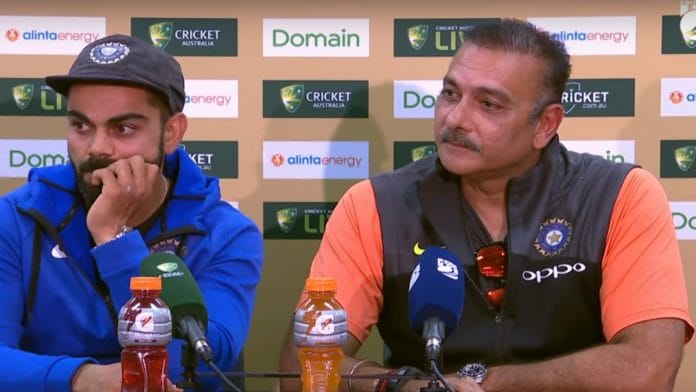In a not so surprising move, Ravi Shastri has been re-appointed as India’s coach. The three members of the BCCI’s Cricket Advisory Committee – Kapil Dev, Anshuman Gaekwad and Shanta Rangaswamy – “unanimously” chose Shastri over other contenders. These included Tom Moody, Mike Hesson, Robin Singh and Lalchand Rajput. Phil Simmons had earlier pulled himself out of the race.
Was there ever any doubt about Shastri’s selection? After all, India’s captain Virat Kohli had already endorsed Shastri. “With Ravi bhai, all of us have a great camaraderie… we will definitely be very happy if he is continuing as a coach…,” Kohli had said just a day before the closure of the application window. Both Kohli and the advisory committee can now deny all they want that his personal preference played no part in the final decision but scepticism will persist.
And who can blame these sceptics? They have been told that Kohli intervened in Shastri’s selection last time as well. They know that Shastri, unlike Anil Kumble, willingly accepts that his role is to essentially kowtow to captain Kohli’s wishes. It doesn’t matter if he is called a “yes-man”; the captain of course will deny the charges.
Meanwhile, Shastri can ingratiate himself further by calling his captain’s team the best that the Indian cricket has produced in the last 15-20 years, even when they are 3-1 down in a Test series. Who can then have problems with Kohli’s fondness for Shastri; indeed, it’s actually very difficult not to fall for the latter’s chutzpah.
Shastri, who also made a name for himself as a commentator, was a regular member of the Indian side between 1981 and 1992. He appeared in 80 Tests, scored 3,830 runs at an average of 35.79, and took 151 wickets. In ODIs, his corresponding numbers were 150 matches, 3,108 runs at 29.04, and 129 wickets.
The highlight of Shastri’s playing career was the “Champion of Champions” award he won for his all-round performance at the 1985 World Championship of Cricket in Australia. Well, that and the Audi he received as a prize.
Also read: Kohli’s preference for Shastri didn’t influence head coach selection, says Kapil Dev
A crisis man
In what will now be his fourth coaching stint, Ravi Shastri has emerged as Team India’s undisputed crisis man. When India crashed out from the first round of the 2007 World Cup and its coach Greg Chappell exited unceremoniously, the team required a temporary coach for its Bangladesh tour. Shastri was then sent with the team as its “cricket manager”.
At that time, Shastri liked to enforce discipline, or at least so he claims. When Sourav Ganguly was reportedly late to reach the team bus one day, Shastri asserts that he asked the driver to leave without Dada. The latter, however, denies that anything like this ever happened. Whatever may have happened back then, and however Shastri was at that time, today he is clearly not considered as a strict coach even when others are.
In 2014, he was made the team director after India’s Test series loss to England while the head coach Duncan Fletcher was still present. Shastri continued in his position until 2016 (Fletcher’s contract had ended after 2015 World Cup) and was “very disappointed” when he was overlooked for the coach’s position in favour of Anil Kumble. But then players’ felt “intimidated” under Kumble and Shastri again became the coach next year.
Thus began the “great camaraderie” between Shastri and the Indian team whose ‘high points’ were Test series losses in South Africa and England, and a semi-final exit at the 2019 World Cup despite being one of the favourites alongside England. A first-time away Test series victory against Australia was certainly historic though, even when one accounts for the absence of Steve Smith and David Warner from the Australian side.
As Ravi Shastri begins his fourth innings with the team, let’s see where this ‘guru-shishya’ bonhomie takes Indian cricket in the coming days.







Felt that the article was overly critic about the current team. Especially the second last paragraph, the author had been too sarcastic.